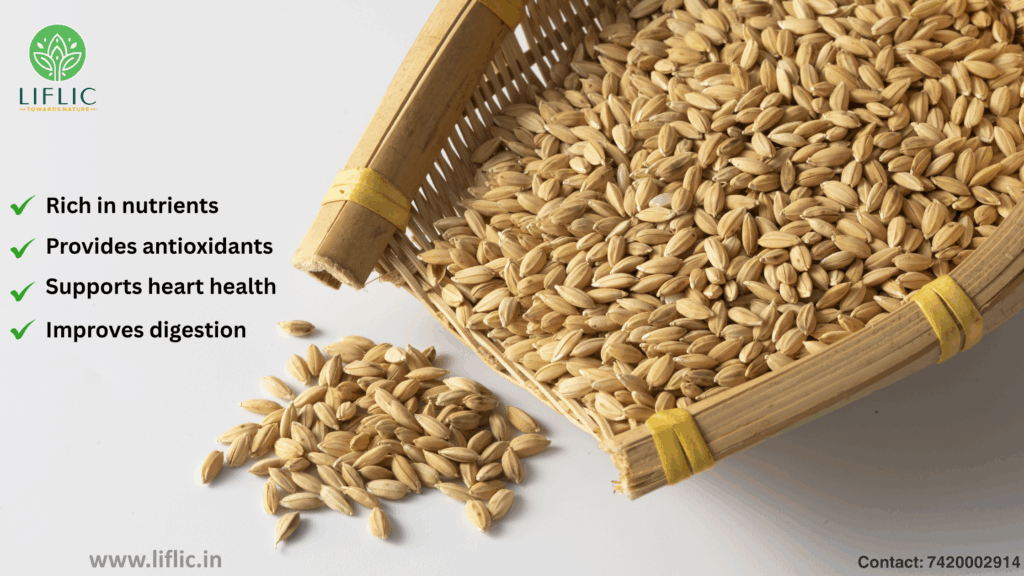
Organic wheat has become one of the most preferred grains among health-conscious consumers. As people shift toward natural and chemical-free food, organic wheat stands out for its purity, nutrition, and sustainable farming practices. It is grown using traditional, eco-friendly methods that focus on soil health, clean water, and natural inputs, making it a safe and wholesome choice for daily consumption.
What Makes Wheat “Organic”?
Organic wheat is cultivated without synthetic fertilizers, pesticides, artificial growth boosters, or genetically modified seeds. The entire process from soil preparation to harvesting follows natural farming principles. Farmers rely on compost, crop rotation, biological pest control, and environmentally responsible water usage. As a result, the grain develops naturally without chemical interference.
Why People Prefer Organic Wheat
Today, searches like “organic wheat benefits,” “chemical-free wheat,” “healthy wheat flour,” and “best organic atta” trend across India because people want food that supports long-term health.
Organic wheat is preferred because:
Since no toxic residues or harmful sprays are used, organic wheat is considered a safer option for families, children, and elderly individuals.
Organically grown wheat often retains more nutrients like fiber, minerals, and natural antioxidants. The grain develops in a balanced environment, preserving its natural quality.
Many people notice that organic wheat flour feels lighter and gentler on the stomach. It supports smoother digestion and reduces bloating caused by over-processed grains.
Organic wheat has a clean, earthy aroma with a richer, deeper flavor profile. Rotis and chapatis made from organic atta are softer and stay fresh longer.
How Organic Wheat is Grown?
Organic wheat farming follows a natural and sustainable approach:
This process ensures that what reaches your kitchen is pure, natural, and safe.
Uses of Organic Wheat in Everyday Life
Organic wheat is versatile and widely used in homes, food manufacturing, and wellness diets. Some common uses include:
Rising Demand for Organic Wheat in India
India’s interest in organic food is increasing every year. Urban consumers are actively searching for “organic wheat price,” “organic atta online,” “chemical-free wheat flour,” and “whole wheat organic atta” as they look for cleaner, safer alternatives. Growing awareness about lifestyle diseases, long-term health, and environmental responsibility has made organic wheat a popular household staple.
How to Choose Genuine Organic Wheat?
Many brands claim to be “organic,” it is important to know what to look for:
Benefits of Organic Wheat Flour (Organic Atta)
Organic atta is a healthier choice for daily cooking:
FAQ’s
Organic wheat is grain grown without chemical fertilizers, pesticides, or GM seeds. It follows natural farming practices from seed to harvest.
Yes, organic wheat is considered healthier because it contains no chemicals, retains more nutrients, and offers better digestibility.
Yes, wheat naturally contains gluten. If you need low-gluten options, some traditional varieties are available but still contain mild gluten.
Organic farming involves natural inputs, manual care, and certification processes, which increase the overall cost. The result is a safer, cleaner product.
Organic whole wheat is high in fiber and keeps you full for longer, helping manage appetite and weight.
Always verify certification, sourcing details, and packaging labels. Choose reputable brands or trusted organic stores.
You can prepare rotis, porridge, bread, noodles, cookies, and other daily meals using organic wheat or organic atta.
Organic wheat | Organic wheat benefits | Chemical-free wheat | Organic atta online | Whole wheat organic atta | Healthy wheat flour | Organic wheat price | Best organic wheat
Copyright © 2025 Magar Natural Food | All Rights Reserved